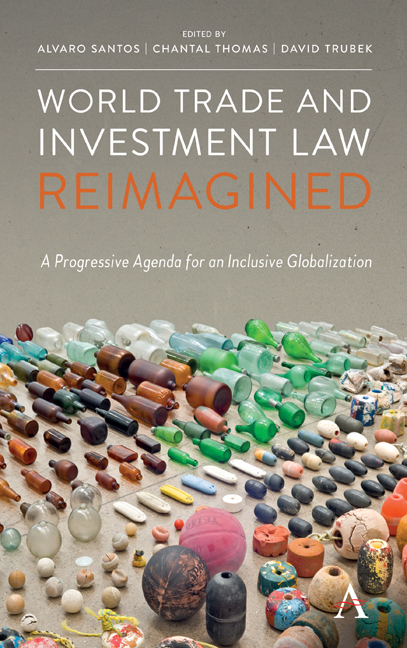Book contents
- Frontmatter
- Contents
- Acknowledgments
- List of Contributors
- Introduction World Trade and Investment Law in a Time of Crisis: Distribution, Development and Social Protection
- PART I RETHINKING THE POLITICAL ECONOMY OF TRADE: COMMENTS ON DANI RODRIK'S STRAIGHT TALK ON TRADE
- PART II SETTING THE STAGE FOR A PROGRESSIVE VISION: EMERGING ISSUES IN WORLD TRADE AND INVESTMENT LAW
- SECTION 1 MAPPING THE NEW CONTEXT FOR TRADE AND INVESTMENT LAW
- Chapter Six The End of Trade and Investment Law as We Know It: From Singularity to Pluralism
- Chapter Seven Heterodox Market Orders in the Global Trade System
- Chapter Eight Embedded Neoliberalism and Its Discontents: The Uncertain Future of Trade and Investment Law
- Chapter Nine Rethinking the RCEP in the Third Regionalism: Paradigm Shifts in World Trade Law?
- Chapter Ten Beyond Normal Trade Law?
- SECTION 2 DEALING WITH MAJOR CHANGES IN THE WORLD ECONOMY
- SECTION 3 FRAMING A MORE EQUITABLE INVESTMENT LAW REGIME
- SECTION 4 SUPPORTING DEVELOPMENT
- SECTION 5 REINFORCING SOCIAL PROTECTION: SPREADING THE BENEFITS OF TRADE, DEALING WITH LOSSES AND EXPLORING THE TRADE–IMMIGRATION NEXUS
- Index
Chapter Seven - Heterodox Market Orders in the Global Trade System
from SECTION 1 - MAPPING THE NEW CONTEXT FOR TRADE AND INVESTMENT LAW
Published online by Cambridge University Press: 07 September 2019
- Frontmatter
- Contents
- Acknowledgments
- List of Contributors
- Introduction World Trade and Investment Law in a Time of Crisis: Distribution, Development and Social Protection
- PART I RETHINKING THE POLITICAL ECONOMY OF TRADE: COMMENTS ON DANI RODRIK'S STRAIGHT TALK ON TRADE
- PART II SETTING THE STAGE FOR A PROGRESSIVE VISION: EMERGING ISSUES IN WORLD TRADE AND INVESTMENT LAW
- SECTION 1 MAPPING THE NEW CONTEXT FOR TRADE AND INVESTMENT LAW
- Chapter Six The End of Trade and Investment Law as We Know It: From Singularity to Pluralism
- Chapter Seven Heterodox Market Orders in the Global Trade System
- Chapter Eight Embedded Neoliberalism and Its Discontents: The Uncertain Future of Trade and Investment Law
- Chapter Nine Rethinking the RCEP in the Third Regionalism: Paradigm Shifts in World Trade Law?
- Chapter Ten Beyond Normal Trade Law?
- SECTION 2 DEALING WITH MAJOR CHANGES IN THE WORLD ECONOMY
- SECTION 3 FRAMING A MORE EQUITABLE INVESTMENT LAW REGIME
- SECTION 4 SUPPORTING DEVELOPMENT
- SECTION 5 REINFORCING SOCIAL PROTECTION: SPREADING THE BENEFITS OF TRADE, DEALING WITH LOSSES AND EXPLORING THE TRADE–IMMIGRATION NEXUS
- Index
Summary
The root causes of the present instability of the international economic order are difficult to diagnose. For some, the core problem is the radically unequal distribution of the gains and losses associated with the recent period of globalization: existing economic institutions and structures have been challenged as those who have lost (or gained little) from globalization withdraw their support from a system that appears not to work to their advantage. For others, the primary explanation is the relative erosion of US global economic hegemony, which has both left the United States less willing to act as the guarantor of the system in its present form and given rise to increasingly urgent efforts to reshape the system in ways that may more reliably sustain existing distributions of economic power. And for yet others, the present system is under attack because it has failed to deliver on its promise of economic self-determination at the national level, as political communities feel their futures constrained and directed by global rules, institutions and logics that seem out of their immediate control.
This short essay starts with the claim that the current period of instability is also the result, in part, of far-reaching changes to the institutional underpinnings of the global economy that occurred during the last quarter century or so after the end of the Cold War. At the time, the years following the collapse of communism seemed to herald a radical reduction in the global economy's institutional diversity as states throughout the former Second and Third worlds converged toward a single model of market capitalism. But the reality has proved more complicated: the national marketization projects initiated during this period have each evolved according to different dynamics, resulting in the emergence of a variety of new and heterodox market forms in different countries and regions of the world. “Every transition to capitalism,” it has been observed, “produced a new variety of capitalism.” These economies have become more deeply integrated with global markets, reopening one of the fundamental questions the postwar international economic order has always faced concerning the legitimate range of institutional diversity fairly permitted in global competition conditions: At what point do heterodox market forms cease to constitute legitimate experimentation and become a form of “cheating” on the terms of fair competition in international trade?
- Type
- Chapter
- Information
- World Trade and Investment Law ReimaginedA Progressive Agenda for an Inclusive Globalization, pp. 73 - 86Publisher: Anthem PressPrint publication year: 2019



